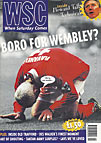 Graham McColl delves into the lowest – and perhaps slowest – point in Celtic's long history
Graham McColl delves into the lowest – and perhaps slowest – point in Celtic's long history
Jock Stein’s first signing for Celtic was Joe McBride, a consummate striker who, in 1966-67, was Scotland’s leading scorer with 35 goals despite missing the second half of the season. In 1980, Billy McNeill gave a debut to a much talked-about goalscorer with the newest of New Wave hairstyles who looked exciting, fresh and eager when first seen warming up on the Celtic Park touchline – Charlie Nicholas.
By 1993, Lou Macari had another individual prowling the touchline. Lumbering up, ready for his debut, was a man whose appearance and pedigree made him seem more a natural understudy for Benny in Crossroads than a centre-forward for Celtic. Wayne Biggins had arrived that November from Barnsley, having scored twice in 13 league matches for the Yorkshire side that season. In his subsequent playing career at Celtic Park, he fully lived up to that enormous lack of promise. He was the perfect totem for the lowest point of the worst period in Celtic’s history.
The litter that scudded wildly across Celtic Park in the recent wind-ravaged match with Raith Rovers may have left a longer-lasting impression on Celtic fans than Biggins’ performances (those crisp packets also moved faster and more purposefully across the penalty box than he usually did). But those fans have much to thank him for. He was one of the most consistent centre-forwards in Celtic’s history: on each one of his 10 appearances he failed to score and that striking record helped to hasten the end for Celtic’s unloved old board of directors.
A more significant contribution – or any contribution at all – from Biggins might have prolonged those directors’ stay. Had he, for example, come on as a substitute in the Scottish Cup tie at Motherwell in January 1994 and scored an equalizer, Celtic might have gone on to win an elusive trophy after five barren years and propped up those directors’ sagging fortunes. Instead, he came on as a substitute and made his usual insignificant contribution in a 1-0 defeat that saw Celtic’s season end in January.
Biggins, Lou Macari’s first signing for Celtic, provided an indication of the direction in which the new manager wanted the club to go and helped Celtic’s players and fans to decide where they wanted Macari – and the old board – to go.
For Macari to bring in a 32-year-old who had thoroughly explored England’s lower-level strata at eight different clubs, never staying more than three years anywhere, was poking the wounds just to see how much they hurt. Biggins made his final appearance just before St Valentine’s Day 1994. There weren’t any broken hearts among the Celtic support on his departure for Stoke.
In the Potteries, an on-tour Celtic side had, decades previously, been described as ‘the greatest team on earth’. Any lingering remnants of that reputation in the area were probably destroyed with Biggins’ arrival in the locals’ midst. He should never have been at Celtic Park in the first place, of course, but whenever Celtic fans nowadays get a tad exasperated with one of their foreign strikers they should think back to Biggins and shudder. The memory of Celtic having gone so low is one of the guarantees that it will never be allowed to happen again.
From WSC 122 April 1997. What was happening this month